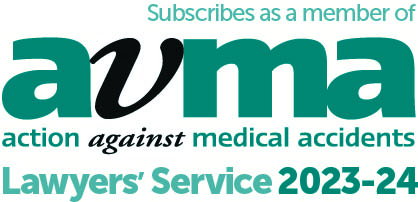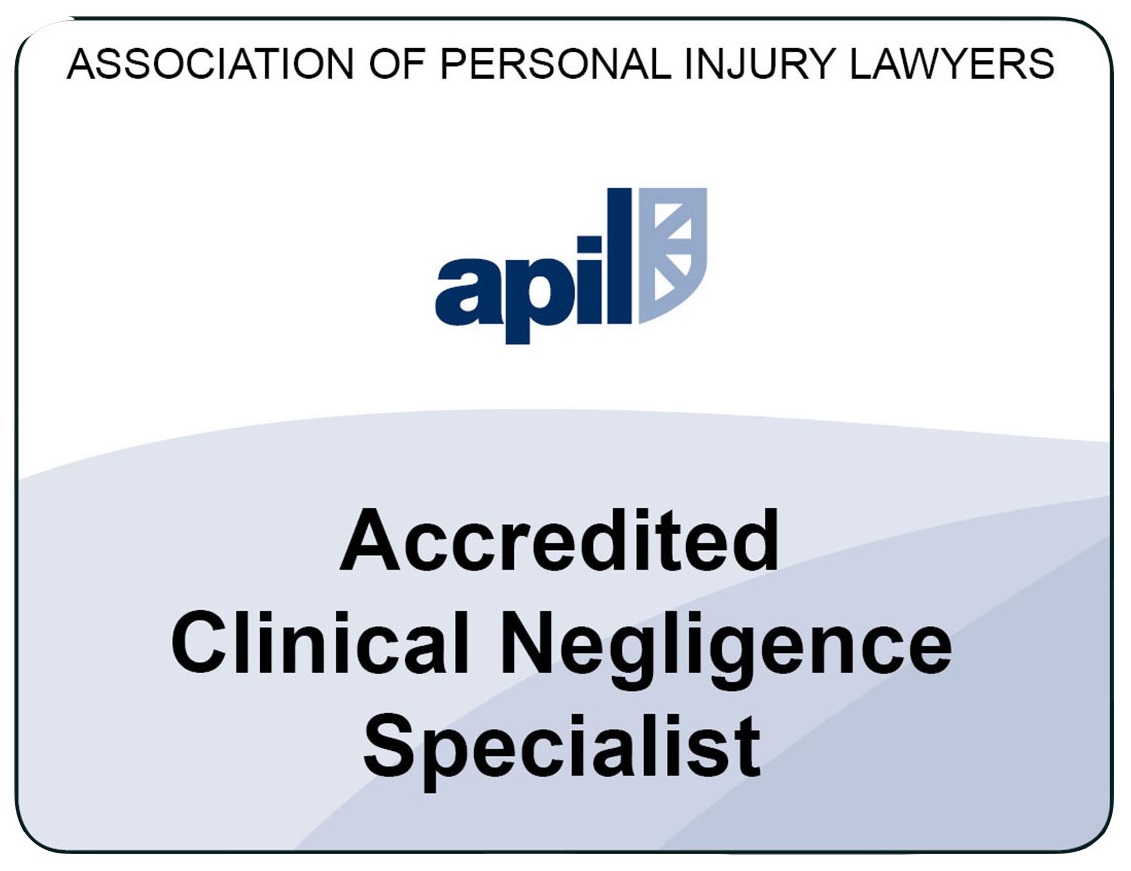You're not alone - don't let medical negligence turn your life upside down
Our experienced solicitors will expertly guide you through your entire medical negligence claim.
What our experts will do for you
We all hope for a positive outcome from healthcare, but sometimes mistakes or neglect by medical professionals do occur and can cause life-changing injuries or disability, leaving you facing a future of uncertainty. This is the time to remember you are not alone.
At Tees, we have teams of experienced legal professionals who will start by simply listening.
Our medical negligence lawyers will guide you from your initial consultation through to achieving resolution whether through mediation, settlement or court proceedings. We focus on building a strong case based on medical records, expert testimony, and full assessment of your losses. We'll aim to help you achieve what you need in terms of compensation and an admission of fault from the doctor and/or hospital concerned.
What is medical negligence?
Medical negligence occurs when substandard healthcare causes or worsens an injury or condition. It is sometimes called clinical negligence or medical malpractice.
Medical professionals' duty of care
To prove clinical negligence, you need to show that a healthcare professional, or a healthcare system, has failed in their care towards you and that you have experienced damage or loss. This can be physical or psychological injury or financial loss.
Why choose Tees?
Medical negligence is one of our core legal services. We are a Legal 500 recommended firm with a track record of successful claims against hospital trusts throughout England and Wales, sometimes taking on cases that other law firms feel unable to handle.
If your case is unsuccessful, you will not be responsible for any fees or costs relating to it as we operate on a No Win, No Fee basis.
Common areas of claim our medical negligence experts can help you with include: -
- Adult, child and baby brain injuries
- Obstetric and maternity cases, including birth injury, stillbirth and neonatal death
- Emergency medicine (Accident & Emergency) misdiagnosis, delayed diagnosis or incorrect treatment
- Orthopaedic care leading to significant pain, loss of mobility or long-term disability
- Amputation
- Spinal injury
- Cancer misdiagnosis or delayed diagnosis
- Fatalities and inquests
Get in touch with our medical negligence team
If you'd like to meet one of our experts for a confidential, no-obligation chat, please get in touch.
Talk to our experts
-

Janine Collier
Executive Partner, Medical Negligence
Cambridge office
Meet Janine -

Alison Hills
Senior Associate, Medical Negligence
Chelmsford office
Meet Alison -

Gwyneth Munjoma
Senior Associate, Medical Negligence
Chelmsford office
Meet Gwyneth -

Sophie Stuart
Associate, Medical Negligence
Cambridge office
Meet Sophie
Medical negligence claims FAQs
Most medical negligence claims are settled under a ‘No Win No Fee’ agreement. This means you won’t have to pay for any legal costs, or costs associated with your claim, unless you are successful. If your claim is successful, the costs are paid from your compensation amount.
Tees takes many medical negligence claims on a ‘No Win No Fee’ basis. Most of our claims are funded using a conditional fee agreement. With this arrangement, if you lose your case, it should not cost you a penny. If you win your case, we will recover most of the costs from the defendants. There may be some deductions from your compensation for costs, but we guarantee that these will be no more than 25% of the total compensation recovered.
You will receive at least 75% of the compensation awarded.
No, we do not charge for the initial assessment. If we are able to take the case beyond the initial assessment, we will then discuss funding options with you such as legal aid, before the event insurance, or a no win no fee agreement. If, as part of the initial investigation, we request medical records on your behalf, you may need to pay for the postage and packaging of these.
Most of our claims are funded using our funding package which means, if you lose your case, it should not cost you a penny. The package includes a conditional fee agreement, a loan facility, and after the event insurance. If you win your case, we will recover most of the costs from the defendants and we will deduct a success fee and any unrecovered costs from your compensation. The costs that are deducted from your compensation will always be limited to a maximum of 30% of the total you receive, guaranteeing that you will receive at least 70% of the compensation awarded.
If you think you may have a medical negligence claim it is important to contact us as soon as possible. If, following our investigation, we consider that there is a strong enough case to bring a claim we will arrange a meeting with you to discuss funding the claim and to take a witness statement.
Once we have all the medical records, we will instruct independent experts to prepare detailed reports into the care you received; these will form the basis of the case. We will gather evidence as to the damage you have suffered and the impact this has already had on your life, and may continue to have into the future. We always seek to conclude cases without the need to go to Court where possible, in order to reduce the stress on you and the time taken to reach a resolution.
During the course of your case you will receive regular progress updates. Usually, your involvement in the claim will include:
- giving a witness statement
- going to meetings with experts to discuss your case
- talking to your solicitor or barrister about any offers made by the Defendant
- attending appointments with experts to report on your condition, prognosis or future needs.
Yes, if travelling is difficult for you we are happy to meet you wherever is most convenient. We are able to visit several times, as needed, to give you time to tell us what happened, to take your witness statement and discuss the ongoing progress of your case.
In most cases, there is a three year time limit for bringing a medical negligence claim. The three years begins from the date of the negligence or from the date that the patient should have known that the injury was or could reasonably be linked to the original negligence.
There are some exceptions to the three year rule:
- If the patient is incapable of managing his / her property or affairs and is a “protected party”, the three year time limit begins when they have capacity to bring the claim.
- For children, the three years begins on their 18th birthday, so claims must be made before they turn 21 in England
- If the patient has died, the three years begins from the date of death
Other dates may also apply, such as where incidents occur abroad, where there is a Human Rights Act claim, or a defective product and so early advice is needed as some time limits are 1 year only.
There is a great deal of investigation work involved in medical negligence claims, so it’s important to contact a solicitor as soon as you can.
The NHS Early Notification Scheme was introduced in 2017 by NHS Resolution, a legal division of the NHS that work on complaints and claims for medical negligence.
The intention of the ENS is to investigate what happened when a child suffers a potentially serious brain injury around the time of his or her birth. The aim is to do this quickly when memories of the events are clear in people’s minds, and in turn to reduce stress on the families concerned.
Doctors and other medical staff must report any case of a child being born in circumstances which could cause a brain injury, to their hospital’s legal team where the birth occurred. The case is then referred to NHS Resolution. If the case fits the criteria, it will be investigated under the ENS. Even though the intention is for investigations to take place as quickly as possible, unfortunately they can take a long time due to the complexities of each individual’s case.
If the medical staff in the NHS Trust are found to be have been negligent, the ENS will give the family a formal written apology. In addition, a package of financial support and advice regarding next steps in caring for the child will be agreed. If you have been contacted in relation to the ENS, it is vital that you seek independent, specialist legal advice.
No, medical negligence claims can be brought against private doctors, surgeons, dentists and other health care providers, not just care or treatment received via the NHS.
What our clients say
Samantha Harvey
Cambridge
Although this experience has been extremely emotional, I have always felt care and compassion from everyone I have dealt with. It has made this whole experience really easy.
I feel that Chantae and the team have worked extremely hard and always had our best interests at heart.
Legal 500 UK 2025
South East
An efficient, empathic and competent group.
Legal 500 UK 2025
South East
The Team in Tees has been absolutely brilliant, always available to help explain and always respond very quickly.
Legal 500 UK 2025
South East
Always available and attentive to any queries I have, very knowledgeable on this area of law and very quickly brought in the necessary experts. Treated me with compassion and explained everything each step of the way.
Legal 500 UK 2025
South East
Great insight into all the problems facing claimants in medical negligence claims. Excellent attention to detail and very good handling of whole claim.
Legal 500 UK 2025
East Anglia
Medical negligence is a very emotive subject. The lawyer at Tees was sympathetic and understanding and treated my case as if it was the only one she was dealing with. She was always available when I needed to speak to her and listened to me, taking into account everything I said.
Legal 500 UK 2025
East Anglia
Tees is a very efficient and friendly organisation. They believe in providing the ultimate customer care and consistently deliver on this.
Legal 500 UK 2024
'From the get go the Tees Law team proved to be listening, caring and sympathetic, through which they were able to understand my needs and tailor their service accordingly. They made very good use of online collaboration tools, which enabled the whole experience to be conducted remotely, negating the encumbrance of long distance travel'
Legal 500 UK 2024
'This practice has a history of high competency and good experience of dealing with clinical negligence claims. Clients can therefore feel reassured that any decisions made are in their best interests. I trust this practice to give me the best advice based on previous knowledge and experience built up over time'
Legal 500 UK 2024
'From the initial contact with this firm, all of the team have acted professionally in not only a legal situation but being compassionate, fully understanding the gravity and personal trauma this negligence claim brought to all my family'
Sandra Purches
Cambridge
'Tees Law has been very good in dealing with what was a very sensitive topic for me. Chantae was very helpful with everything'
A - Bishop's Stortford
'We went to Tees for help with a medical negligence case, they provided amazing support, understanding and care.
Katheryn explained the process of our case, she’s been absolutely amazing, not only in an exceptionally professional way but in a personal and empathetic way as well.
The result found us very satisfied'
A
Cambridge
'A heartfelt thank you for all you have done in preparation for and during the settlement meeting, as well as for your unfailing support along the way, in and out of hours. It is undoubtedly due to your high professionalism if the outcome today has exceeded all expectations; it will be a huge help for us going forward and we will be forever grateful'
K Bartholomew
Chelmsford
'Tees Law responded with immediacy and the utmost professionalism regarding a medical negligence enquiry. I found the communication, attention to detail and knowledge of the subject to be very impressive, and a legal service I could trust. I would certainly consider using them for legal matters in the future. A personable, reassuring and proactive service. Recommended'
Susan Hickman
Cambridge
'We consider ourselves fortunate to have been recommended to Tees by the solicitor we initially approached. We did not realise it until the case was well established that the level of professional care we were receiving was exceptional and that the experience of the individuals and the contacts they have to assist in a very complex case was the best available.
We are grateful that we received a satisfactory settlement as a result of their efforts under difficult circumstances and dealing with defendants that were obstructive and disorganised. By far the greatest benefit for us however is the fact that the victim, with assistance from highly skilled experts that we would not have known about otherwise, learned to walk short distances when all other medical opinion did not consider this possible. This was their greatest achievement which is well beyond the service we expected'
Miss Lauren Addicott
Hove
I came to Tees with no knowledge of how a medical negligence claim would work or the machinations of the compensation system. My assigned paralegal, Katheryn Rigg, was consistently helpful, clear, available and empathetic. I am very pleased with not only the end result, but with how swiftly the process was completed.
Ms M.K
Chelmsford
I cannot thank Gwyneth enough, she was so friendly, kind and took the time to explain everything so that I understood every aspect of my case. She was sympathetic to areas that were sensitive to me and made the whole process, which could have been painful completing, easy for me.
Mr and Mrs Robin Lincoln
Bishop's Stortford
Tim Deeming took me through the settlement process step by step and was a master tactician in the final negotiation, who I was proud to have represent me. Katheryn Riggs gave me all the support to file the claim. Tees draw on their vast experience to bring the very best medical experts to the table.
Mr Colin Keating
St. Ives, Cambridgeshire
Tees as a company and service were fantastic in every respect. The expertise and solutions are brilliant. We had difficult times but Tees took control of everything and the third parties they involved in our case were top of their field - their skills and knowledge were magnificent.
Related services
- Accidents and Emergency claims
- Amputation medical negligence
- Brain injury claims
- Birth injuries to the baby
- Birth injuries to the mother
- Cancer claims
- Cardiology negligence claims
- Cerebral palsy claims
- Child injury and paediatric negligence
- Deaths & Inquests
- Deep Vein Thrombosis (DVT) and pulmonary embolism (PE) claims
- Ear, Nose and Throat (ENT) claims
- Gall bladder negligence claims
- General medicine claims
- General Practice (GP) claims
- Gynaecology claims
- Hernia surgery negligence claims
- Medical consent claims
- Midwife negligence claims
- Orthopaedic (bones & joints) claims
- Plastic surgery and weight loss surgery claims
- Post-traumatic stress disorder (PTSD) after birth claims
- Sepsis medical negligence claims
- Solicitor negligence claims
- Stillbirth and neonatal death compensation claims
- Surgery claims
- Wrongful birth claims







